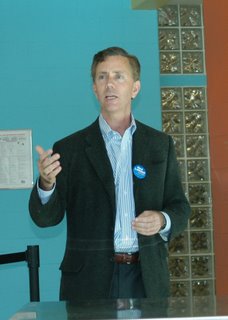
When former senator and governor Lowell Weicker – now retired, sort of – looked around to tap someone to run against his battle hardened old political enemy, current Senator Joe Lieberman, his gaze fell upon fellow Greenwich millionaire Ned Lamont, who obligingly agreed to pay any price, shoulder any burden for the sake of his party and Weicker.
Weicker is pretty much the antitheses of a party guy, famously having denominated himself “The turd in the Republican Party punch bowl.” Lamont wants to be a party guy; at least, he has surrounded himself with party activists who claim they have the best interests of the Democrat Party in mind – with one exception.
That would be Tom D’Amore, Wicker’s battle hardened major domo and no friend to political parties. D’Amore has been around the political block several times, as an aide to former governor Tom Meskill, later as Weicker’s chief aide and state Republican Party Chairman, still later as an aide and consultant to Russ Potts, an “independent” candidate for governor of Virginia.
Under D’Amore’s tutelage, Potts, according to a Times Dispatch story, “explained his own conversion from a conservative Republican to a tax-raising Republican maverick.” Said the maverick Republican turned Independent, “only a damned fool doesn't change his mind. The only person you should be afraid of is a guy who has made bad decisions and is afraid to admit a mistake."
When the votes were tallied, Potts managed to garner 2.2% and enjoyed a political afterlife as an independent Republican. When Virginia’s Republican stalwarts suggested that Republicans do not generally run as independents against other Republicans in gubernatorial campaigns, Potts replied in Weikerian tones that he regarded himself as a Republican and refused to allow others to define him. At the end of his various transmutations, no one was quite sure what kind of a political animal Potts was. He seemed to be masterless. Bob Dylan probably had it right when he said that everyone is a slave to some master; but independents have several masters, some of whom are paid political consultants.
At some point, Lamont’s most ardent supporters must confront the realities of winning a campaign. Primaries sometimes are decided by political activists, but general elections are decided by a majority of voters. Unaffiliated voters plus the loyal opposition usually outnumber the members of either major party considered separately. If a general election is the dog, party activists are the tail, and only in nightmares do tails wag dogs.
Before Lamont reaches a general election, he must leap over at least one daunting hurtle: Unless Lamont wins 15% of the delegates at the Democrat nominating convention or obtains between 15,000 and 16,000 petition signatures, there will be no primary. If there is no primary, Lamont still may enter the general election on a third party ticket, in which case his appeal to voters in a general election will be decisive. But all the polls indicate that Lieberman’s appeal in a general election is broad based, despite feelings of animosity between Lieberman and liberal leaning party activists. In a general election, emotions that have made liberals swear eternal enmity towards Lieberman will be submerged in a sea of votes and so diluted. Though Lamont has yet to fleshed out his campaign, his present message is narrowly tailored to appeal to left leaning Democrat activists.
Democrat incumbents like Chris Dodd and members of what might be called the Democratic Party proper, so very proper, continue to wonder at the apparent recklessness of the Lamontites. Despite the enormous wart on Lieberman’s face – his support of President George Bush, the Iraq war and, perhaps even more, the senator's unwillingness to get in Democrat trenches and throw rhetorical grenades at the opposition – do the Lamonties not understand, proper Democrats ask, the calculus of elections? Rell is weighty and her popularity mass threatens to pull other Republicans with her into office; therefore Democrats need a moderate in the political scales to offset her; that would be Lieberman.
Lamont has answered his critics by begging them to chill out. Connecticut is a Democratic town, he points out, and one of the two Democrat contenders -- himself or Lieberman; preferably himself -- is bound to win the election, however fractious. His challenge will have a beneficial effect: Even if Lamont loses, Lieberman will have been chastised, and his course for the next decade will adjust to the drubbing. No one is begging off and various interests in the Democrat Party are busy sapping the Lieberman campaign – including political freebooters like D’Amore who, everyone may be certain, will be well paid for his efforts.
Comments